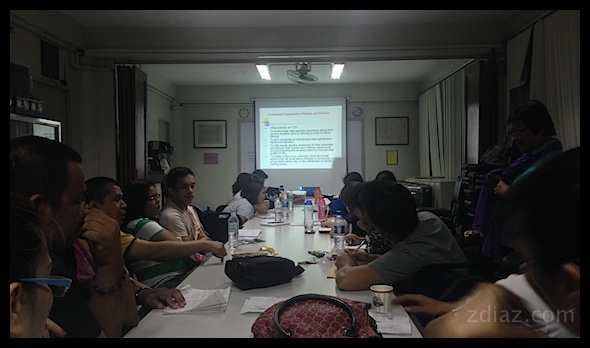The topic for Day 6 was on “Conflict”. The subject seems to be a constant challenge facing social workers in all client systems especially in communities. Our discussion started on the type of conflicts moving on to the type of persons that should deal with conflict, response or personal ways of addressing conflict and resolution to conflicts. Several topics on dispute resolution especially alternative dispute resolution were also discussed. After the discussion we were then divided into 3 groups and given a small conflict scenario wherein we were asked to act it out in a role-play exhibiting the wrong way and the proper way in resolving conflict. The next topic was on advocacy and partnership building especially with non-government organizations and companies with corporate social responsibility. (CSR) After the lecture our batch mates from the Department of Social Welfare and development (DSWD) gave us an overview of the DSWD’s National community driven Development program. … [Read more...]
Contemporary evolutionary cognitive archeology: Contrasting early approaches to the development of cognition
In 1979, entirely independent of one another, three articles appeared that became very influential, and mark a kind of beginning point for contemporary evolutionary cognitive archaeology. Anthropologist Sue Taylor Parker and Neurobiologist Kathleen Gibson wrote “A developmental model for the evolution of language and intelligence in early Hominids.” Archeologist John A.J Gowlette wrote “Complexities of cultural evidence in the Lower and Middle Pleistocene” while Archeologist Thomas Wynn wrote “The intelligence of later Acheulean hominds” Again, let me emphasize that personally I do not take the position of any of the articles writer as I am more biased towards intelligent design. I am merely discussing the position of the different scholars in the field of cognitive archeology and how their thoughts have contributed to contemporary evolutionary cognitive archeology. Parker and Gibson advanced in their paper that stages of development of intelligence and language in our species … [Read more...]
Contending for the faith: Apologetics studies online at Ravi Zacharias International Ministries (RZIM) Academy
Apologetics is the discipline of defending a position (often religious) through the systematic use of information. I had always been interested in apologetics and my training as a lawyer and my being a pastor has greatly spurred my interest in the subject. It easy to loose one’s one faith especially now that information on almost anything is widely available in the Internet. Attacks on the supremacy of Scripture and on Christianity in general are prevalent and frankly speaking churches seems to be loosing the battle. According to the site gotquestions.org, in a survey conducted by the Barna Group it was found out that less than 1 percent of the young adult population in the United States has a biblical worldview. Even more startling, the data shows that less than one half of one percent of Christians between the ages of 18 and 23 has a biblical worldview. Additionally, two studies conducted by both the Barna Group and USA Today, found that nearly 75 percent of Christian young … [Read more...]
The Beginnings of Cognitive Archeology: the foundations laid by the works of Holloway and Glynn
The study on how humans of the past thinks as reflected on the material culture that they left behind is what Cognitive Archeology is all about. And although critics say that the field is highly speculative in nature, it cannot be denied that the material remains of past cultures gives us access to the thought processes of the people that made them. In order to achieve a thorough analysis, cognitive archeology utilizes and combines the theories and methods of other sciences in order to come up with a reasonable and somewhat logical conclusion in interpreting the thoughts processes of ancient cultures as reflected in their material culture. In this sense, Cognitive Archeology is a truly multi-disciplinary discipline. The early beginnings of Cognitive Archeology can be traced to two papers written by South African Paleolithic Archeologist Ralph Holloway Jr. in 1969 and by Physical Anthropologist Isaac Glynn in 1976. Both articles are regarded as that which started the beginnings of … [Read more...]
My Community Organising & Development Certificate course experience Day 3, 4 and 5
Days 3 was spent discussing Social work method and practice. Our speaker was Ms. Miriam Estrada, head of the Social work department of the Saint Theresa’s college Cebu. According to her, in the Philippines we use the Generalist/integrated method of social work practice. Among other things it is characterized by the use of one or any client system as entry point for working with another or other client system. I’ve heard about the terms “case work”, “group work” and community work before and I had a faint idea on what it really means although the english terms might reveal some ideas on what it is about. These terms refer to the work done with corresponding client systems. Work on individuals is referred to as “case work” etc. Social workers work with Individuals, families/groups and communities, and these are referred to client systems which social workers may use as entry points to achieve the goals of social work. The Generalist/Integrated method also provides a holistic problem … [Read more...]
- « Previous Page
- 1
- …
- 9
- 10
- 11
- 12
- 13
- …
- 103
- Next Page »



